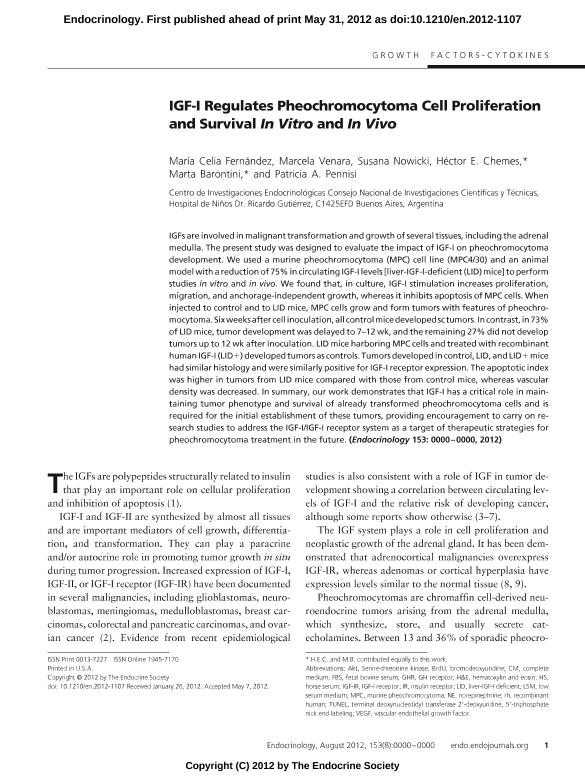Artículo
IGF-I regulates pheochromocytoma cell proliferation and survival in vitro and in vivo
Fernández, María Celia ; Venara, Marcela Cristina
; Venara, Marcela Cristina ; Nowicki, Susana
; Nowicki, Susana ; Chemes, Hector Edgardo
; Chemes, Hector Edgardo ; Barontini, Marta Beatriz
; Barontini, Marta Beatriz ; Pennisi, Patricia Alejandra
; Pennisi, Patricia Alejandra
 ; Venara, Marcela Cristina
; Venara, Marcela Cristina ; Nowicki, Susana
; Nowicki, Susana ; Chemes, Hector Edgardo
; Chemes, Hector Edgardo ; Barontini, Marta Beatriz
; Barontini, Marta Beatriz ; Pennisi, Patricia Alejandra
; Pennisi, Patricia Alejandra
Fecha de publicación:
08/2012
Editorial:
Endocrine Society
Revista:
Endocrinology
ISSN:
0013-7227
Idioma:
Inglés
Tipo de recurso:
Artículo publicado
Clasificación temática:
Resumen
IGFs are involved in malignant transformation and growth of several tissues, including the adrenal medulla. The present study was designed to evaluate the impact of IGF-I on pheochromocytoma development. We used a murine pheochromocytoma (MPC) cell line (MPC4/30) and an animal model with a reduction of75%in circulating IGF-I levels [liver-IGF-I-deficient (LID) mice] to perform studies in vitro and in vivo. We found that, in culture, IGF-I stimulation increases proliferation, migration, and anchorage-independent growth, whereas it inhibits apoptosis of MPC cells. When injected to control and to LID mice, MPC cells grow and form tumors with features of pheochromocytoma. Sixweeksafter cell inoculation, all control mice developed sc tumors. In contrast, in73% of LID mice, tumor development was delayed to 7-12 wk, and the remaining 27% did not develop tumors up to 12 wk after inoculation. LID mice harboring MPC cells and treated with recombinant humanIGF-I (LID+) developed tumors as controls. Tumors developed in control, LID, and LID+mice had similar histology and were similarly positive for IGF-I receptor expression. The apoptotic index was higher in tumors from LID mice compared with those from control mice, whereas vascular density was decreased. In summary, our work demonstrates that IGF-I has a critical role in maintaining tumor phenotype and survival of already transformed pheochromocytoma cells and is required for the initial establishment of these tumors, providing encouragement to carry on research studies to address the IGF-I/IGF-I receptor system as a target of therapeutic strategies for pheochromocytoma treatment in the future.
Palabras clave:
Igf-1
,
Igf-1r
,
Pheochromocytoma
,
Mouse Model
,
Liver Igf-1 Deficient (Lid) Mice
Archivos asociados
Licencia
Identificadores
Colecciones
Articulos(CEDIE)
Articulos de CENTRO DE INVESTIGACIONES ENDOCRINOLOGICAS "DR. CESAR BERGADA"
Articulos de CENTRO DE INVESTIGACIONES ENDOCRINOLOGICAS "DR. CESAR BERGADA"
Citación
Fernández, María Celia; Venara, Marcela Cristina; Nowicki, Susana; Chemes, Hector Edgardo; Barontini, Marta Beatriz; et al.; IGF-I regulates pheochromocytoma cell proliferation and survival in vitro and in vivo; Endocrine Society; Endocrinology; 153; 8; 8-2012; 3724-3734
Compartir
Altmétricas



